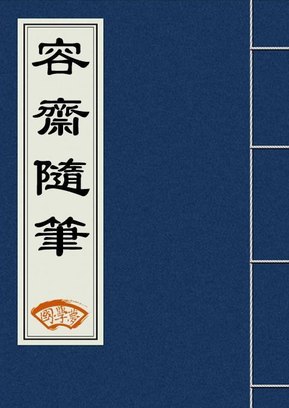
Cover of Hóng Mài’s “Scribblings” (A Mainland Printing)
Content created: 2022-07-23
File last modified:

Easily the best known collection of pre-XXth-century ghostly and supernatural tales in China comes from the hand of Pú Sōnglíng 蒲松龄 (1640-1715).
But he was hardly alone among literati recording inexplicable events. Another prolific writer was YUÁN Méi 袁枚 (1716-1797). Yet another, some centuiries earlier than the other two, was the Southern Sòng 宋 dynasty (period 15) writer HÓNG Mài 洪迈 (1123-1202)
Hóng was born in Póyáng County 鄱阳县 in Jiāngxī 江西 province in southern China. His father was a Sòng dynasty official and is known to have participated in the negotiations involved with the Sòng retreat in the face of northern invaders from what we know as the Jīn 金 dynasty (period 18).

Hóng would have been a child in 1127, when the Sòng state (and many refugees) retreated before Jīn invaders and the royal house established a new capital at Lín’ān 临安 (modern Hángzhōu 杭州) in the Yangtze basin farther south, and much nearer to his home in Póyáng.
(Although the Sòng is a single dynasty for some purposes, for other purposes the northern and southern capitals define separate northern and southern Sòng dynasties, periods 15b and 15c in the scheme used on this web site, where "period 15a," like "period 15,"is specifically the entire Sòng. For maps and a quick overview of the Sòng, click here .)
As a scion of an elite family, Hóng received an excellent education, took and passed civil service exams, and in 1145, at the age of about 22 received an appointment in the Division of Transportation 转运司 (Zhuǎnyùn Sī). In 1162 he was sent on a diplomatic mission to the Jīn state, which had moved into the northern Sòng lands, but, unsurprisingly, little came of the negotiations.
After his return Hóng was appointed to a magistracy in the important city of Jízhōu 吉州 (today’s Jí’ān 吉安) in Jiāngxī province, and eventually to other, yet more important appointments, culminating in his appointment in 1190, in his late 60s, as the magistrate of Shàoxīng 绍兴 in Zhèjiāng 浙江 province (a city famed today for its potent liquors). There he is known to have undertaken a review and revision of the census records
Hóng Mài was a member of the committee charged with compiling the official chronicle of the previous dynasty (a very old Chinese dynastic tradition). However, what he himself probably took as his most serious literary output was editing a large collection of Táng dynasty (period 12) poetry, an editorial project now lost.

But his literary impulses were not confined to editorial tasks or official papers. He also wrote hundreds of brief descriptions and essays, and recounted the stories circulating in society around him.
Even as a child, Hóng would already have seen a good deal of death and dislocation and heard refugee tales of burned out towns and mounds of rotting corpses, and rumors and fantasies of monsters, zombies, and troubled ghosts would have been multiplying throughout his youth as Sòng society and its dislocated populations tried to recover from the loss of its northern lands.
It was in the context of Sòng failure and reduction that Hóng undertook his massive collection of the wondrous and the inexplicable for which he is best known. This famous work, Notes From Yíjiān County (Yíjiān Zhì 夷坚志), was first partially published in 1161 with some additional parts being released through about 1198, and a revision in 1202, the year of Hóng Mài’s death in Hángzhōu. Of the putative original length of 420 “scrolls,” only 50 remain to us these eight hundred years later.
But that was not all. Hóng Mài was also known by his given name (zì name) of Jǐnglú 景卢 and nicknames (hào names) Yěchǔ 野处 and Róngzhāi 容斋, and the most prominent of his writings other than the Yíjiàn stories is “Róngzhāi’s Scribblings” (Róngzhāi Suíbǐ 容斋随笔), a work still widely reprinted. Covers of two modern printings are shown here.
When he died at the age of 80, Hóng Mài also received the post-mortal name/title of Wénmǐn 文敏, which literally means “cultivated and perceptive,” but which, as a phrase, also has literary resonances impossible to reproduce in translation. He would have been pleased.
It seems likely that Yíjiān 夷坚 was a place name —and I have treated it as a county— but I have not been able to identify it specifically. Yí can mean “safe” or “calm,” but it can also mean “exterminate” or can refer to vicious and barbaric foreigners. Jiān usually refers to a stronghold, but can also describe anything strong, from winter ice to martial determination.
Although “safe fortress” (or “calm refuge”) makes a plausible place name, today the term seems to occur only in reference to Hóng Mài’s literary work. However, the expression may (also?) be a literary allusion to an expression in Lièzǐ’s 列子 “Questions of King Tāng” 汤问篇 (“From a safe refuge I listen and note down” 夷坚闻而志之), a famous Vth-century BC text that would certainly have been known to Hóng Mài.